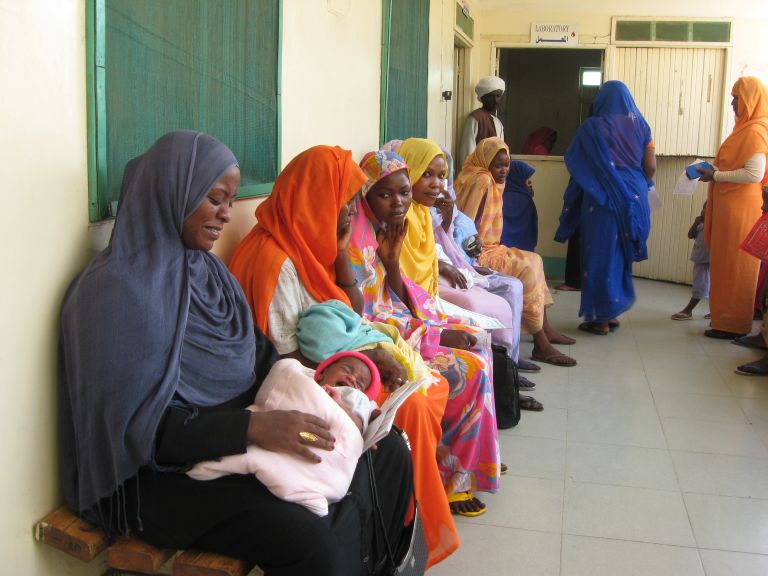Sudan: MSF hands over reproductive health unit in the Red Sea State

On December 31, 2010, the international medical humanitarian organisation, Médecins Sans Frontières (MSF), will hand over the reproductive health unit in Tagadom Hospital - in the Sudanese city of Port Sudan - to the Ministry of Health.
MSF started supporting Tagadom Hospital in 2005, initially by providing general medical consultations, antenatal care, trainings for the hospital’s staff, equipping the laboratory, and providing drugs and medical supplies to the hospital. In 2006, MSF inaugurated a delivery room, laboratory, waiting area, latrines and waste management area and the entire hospital ground floor
In 2007, MSF supported the Ministry of Health in opening and setting-up the only reproductive health unit in the area. At the time, the majority of the women of Tagadom and the neighboring areas delivered in their homes with the assistance of a traditional birth attendant. Today more and more women come to deliver in the hospital, benefitting from high-quality medical care, including women with complicated deliveries.
In coordination with the Ministry of Health, the reproductive health unit provides a range of free services, including antenatal and postnatal care, delivery services, family planning, sexually transmitted infection (STI) treatment and reproductive health counseling.
De-infibulation, the de-stitching of the vaginal outer lips, is performed when preparing an infibulated woman for delivery. In the MSF-run reproductive health unit mothers are not re-infibulated, or stitched back; after delivery because of the grave medical consequences.
The women in Tagadom and the nearby areas endure the most harmful form of female genital cutting (FGC): type 3 or pharaonic. This involves the removal of the outer female genitals, and infibulation or the stitching of the remaining outer vaginal labia, leaving but a small hole for urine and menstrual flow to pass through. This painful procedure is often performed on babies as young as seven-days-old and affects a female from childhood, into puberty and adulthood, with serious consequences for motherhood.
MSF health promoters explain that female children and adults who have undergone this procedure may face fatal bleeding, infections such as tetanus, develop cysts, experience painful menstruations and recurrent urinary tract infections. Many women will suffer acute pain during sexual intercourse. If they give birth, their labors are likely to be prolonged, increasing medical risks for the newborn.
In 2006 about 69% of females in Sudan and 80% of females in the Red Sea state had undergone some form of FGC1. In Tagadom and neighboring areas the numbers were even higher, with 98% of females undergoing some form of FGC2.
“MSF’s health promotion team has achieved remarkable results in reaching out to the women and communities, discussing reproductive health issues and in particular the medical effects of FGC. Giving women complete information about their health, together with free, quality reproductive healthcare, is key to the increase in hospital attendance by women,” said Guilhem MOLINIE, MSF Head of Mission in Sudan.
From January 1, 2007 to December 30, 2010, Tagadom Hospital’s medical teams helped deliver 5,352 babies, conducted 51,506 antenatal consultations, and 7,838 women attended family planning sessions. Earlier this year MSF built and furnished an operating theatre to assist women with complicated deliveries and cesarean section; since then 71 cesarean sections were performed.
MSF is confident that the work it started in Tagadom Hospital will carry on under the auspices of the Ministry of Health.
Dr Massara Mohamed Osman MENYAN, Tagadom Hospital’s Director said, “For the last five years, MSF in collaboration with the Ministry of Health, provided free, first-rate reproductive healthcare. Before MSF’s support the hospital did not have a reproductive health unit, now there is one with all services available, including an operating theatre for complicated deliveries. With MSF leaving, the reproductive health unit will continue under the care of the Ministry of Health.”
MSF has been working in Sudan since 1979, and currently provides medical assistance in Warrap, Jonglei, Upper Nile, Unity, Western and Northern Bahr El-Ghazal, Western and Central Equatoria, the transitional area of Abyei, North and South Darfur, Red Sea and Al-Gedaref states.
Médecins Sans Frontières (MSF) is an independent medical humanitarian non-governmental organisation, and works in more than 70 countries. MSF teams assist people in distress irrespective of their religion, race or political beliefs.
[1] Sudan Household Health Survey. Ministry of Health: 2006, Khartoum, Sudan
[2] Safe Motherhood Survey – National report 1999, Central Bureau of Statistics, Khartoum, Sudan.





Leave a Comment